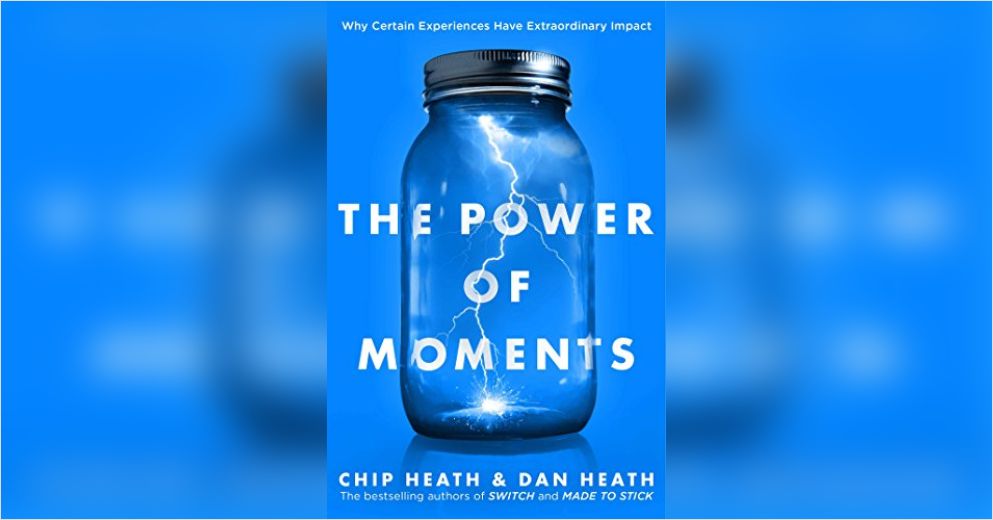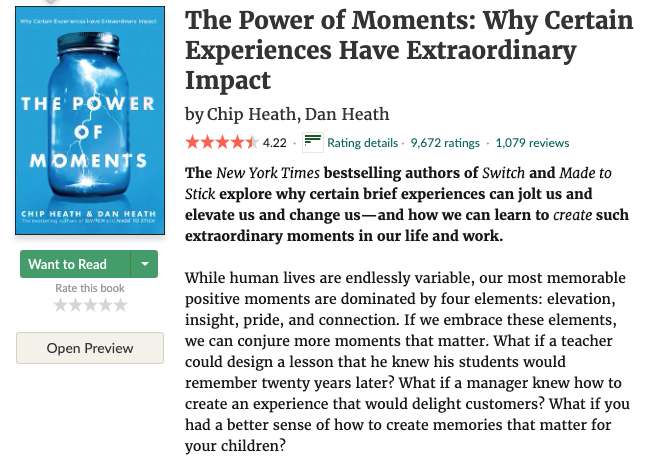
Reading: The Power of Moments - Chip and Dan Heath
2020, Sep 13
“The Power Of Moments: Why Certain Experiences Have Extraordinary Impact”, by Chip Heath and Dan Heath

Crystallization of discontent
- Shame and disgust are powerful motivators “what are we doing - are we even human?”
- Crystallization of discontent is a specific moment that sparks a realization that something isn’t okay.
- Something that is an engineered moment that can be powerful.
Aha moment is created IN the moment
- Leader knows what truth they want to share
- Realization strikes fast (minutes, hours)
- Audience discovers truth themselves - becomes their own insight
“Let them trip over the truth.”
- Being a salesman vs letting them trickle the truth. Let them understand the problem.
- Self insight only comes from stretching yourself - putting yourself out there where you can risk an outcome
Positive peaks are more memorable that negative peaks
- Mentors create a productive level of stretch
- Making yourself vulnerable. Taking a risk - helps you also understand risk about yourself
Mentors push. Mentees stretch.
How to be a good mentor:
- “I’m giving you these comments because I have high expectations and I know you can reach them.” vs. “You should make these changes”. The former is more impactful.
- This re-wires how people take feedback. It’s a push to stretch.
- Tension of mentoring: over and under protecting them
Learn to embrace failure. Ask regularly: “What did you fail at this week?”
- Push to stretch. Make it part of a casual conversation rather than an end.
- Willingness to put yourself in a place that you can fail
- The goal is LEARNING
High expectation + assurance + direction + support = formula for mentorship to help mentees realize insights
Moments of pride
- Pride is when your skills recognized by others
- Recognition is a very powerful motivator and reward
- “I saw what you did, and I appreciate it.” Make the recognition public.
Learn to use gamification strategies: “level up” strategy to adapt your goals
Example: I have a goal to learn how to DJ and mix music.
- Level 1: follow a YouTube video on DJ skills
- Level 2: play something that I can upload on Mixcloud
- Level 3: play at a friend’s birthday or house party
Learn to create moments of pride for everyone
Learn how to proactively create intermediate milestones for yourself and others. Create moments of pride is extremely impactful.
Managing moments of fear:
- Your journey goes through Milestones, Peaks, and Transitions.
- Successful people have an OBSESSION TO COMPLETION
- Exposure therapy - managing fear to learn how to act with a moment of courage
- Use steps and levels to motivate yourself to push boundaries
- You need need to practice stressful moments” interactively. Practice your courage to learn how to react. Rehearse what you’ll do and say.
Ensure that your environment is set up for success
- Relentless pressure for results + avert eyes management = cut corners and fraud (e.g. banking scandals)
- Blurry accountability + get things done urgency = accidents (eg. car accidents)
- Leader Bias + permissive environment = abuse
How to create a moment
- Break the script (something unexpected)
- Boost sensory appeal (make it memorable)
- Raise the stakes (make it matter)
Creating moments of connection
- Moments can create shared meaning and bond between people
- Can’t deliver great customer experience if you don’t have great employee experience
- Synchronization event must be done together to be powerful and feels real (remote content is okay for a daily review, but needs to be in person for an impactful moment)
- Perceived pain drives pro-sociality and bids people together
- Bond comes from struggle together eg. Fraternity hazing
Passion vs purpose
- Passion = enthusiasm (passionate people are still poor performers if they don’t have purpose. Passion is Individualistic - can be isolating)
- Purpose = meaning (can be cultivated!!)
- Purpose is more important than passion. Passion is like fire that can be powerful but misused.
- Purposes can bring people together and make them “work through the suffering” and build stronger bonds
It is more important to have purpose.
Connecting to meaning helps people find their purpose, and strong purpose can make shared meaning
Ask your customers and stakeholders what is their purpose, not just our interpretation of what is right and what we think the solution might be. “What matters to you?”